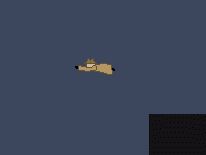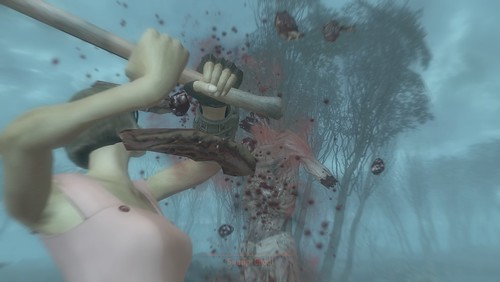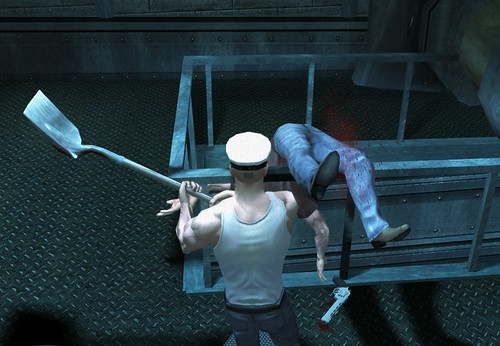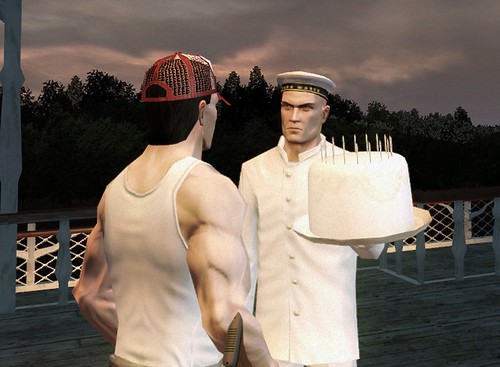TOM FRANCIS
REGRETS THIS ALREADY
Hello! I'm Tom. I'm a game designer, writer, and programmer on Gunpoint, Heat Signature, and Tactical Breach Wizards. Here's some more info on all the games I've worked on, here are the videos I make on YouTube, and here are two short stories I wrote for the Machine of Death collections.
Theme
By me. Uses Adaptive Images by Matt Wilcox.
Search
Private Dick
I’m making a game! I will probably never finish it! But I thought I’d start talking about it anyway, to keep my goals straight and get feedback on my ideas as I go.
I’m doing it because Spelunky, one of my favourite games ever, was made by one guy in a program called Game Maker. Obviously it doesn’t follow that “If design/coding/art genius Derek Yu can do it, I can too!” But it does make you realise that game-making programs aren’t just for shitty test games. Since that was pretty much my last remaining excuse for not doing this thing I’ve had a constant urge to do most of my adult life, I started doing it.

My game is about a little dude in a trenchcoat who sorts out – or completely screws up – delicate problems like hostage situations, with a few pseudo-science special abilities. He’s sort of a drunk, asshole Inspector Gadget – hence the working title, Private Dick.
I wanted to see if, with little time, less talent and no experience, I could make a game that would achieve some of the things I’ve always wanted from the games I play. I want a game where:
A gun going off is a big deal. Existing games tend to be divided into ones where guns go off constantly, and ones where guns don’t exist. The latter don’t have enough guns for my tastes, and in the former guns become meaningless. You shot a man in Reno? I shot 384 men 7 times each in Vegas, and I still didn’t complete that game. The reason guns are an exciting element in a thriller is that they can enact sudden, massive, shocking, permanent change. I want to see them play that role in a game.
Failure isn’t terminal. In most games, you do what you’re supposed to or you die and retry. Even if you don’t physically die, failure means a restart. I want a game where life goes on if you fail the mission, and most of the ways you can fail don’t kill you. The story adapts to the outcome of your missions, and death is a rare, shocking, worst-case scenario. I don’t want anyone to have to repeat anything unless it makes no sense to continue. Edit: More on this in the comments.
You can change things in non-destructive ways. You can change them in destructive ones too, but that comes as standard in gaming. I don’t know if I can make anything you could meaningfully call emergent with my resources, but I want to make a game whose levels you can tinker with, reconfigure to your liking, and see those reconfigurations interact with each other – not just with you.
Movement is superhuman, but constrained by physics. I need it to be superhuman because I want getting around to be quick and satisfying, but I want it to be physically coherent. Most games don’t do this: almost all platformers let you move your guy around while he’s in the air, by some unexplained force. I’m not going to do anything fancy with physics in my game, and it’s not going to be primarily about movement the way platformers are, but I want the movement to make physical sense. Anything that doesn’t isn’t convincing to me, and that hurts a game’s feel.
It’s this last thing I’ve been working on so far, a few evenings a week. I’ve nearly got it FYS – Functional, Yet Shit. This is my standard for implimenting a mechanic before moving on – there’s no sense fine tuning or fully animating until I know how it fits in with everything else. Getting movement to that point will put me about 10% of the way to a playable level that includes all the main elements I want in this game. I’ll be surprised if it takes less than six months, sad if it takes more than a year, and amazed if I stick with it that long.
Writing about it here is one way I’m trying to improve its chances of reaching a playable stage. Explaining it to someone else forces me to keep my thinking clear, explaining it to you guys might be a good way to get feedback, and explaining it publicly makes giving up all the more embarrassing. So far I haven’t told you much, but if you’ve ever worked on a game I’d love to hear any general advice.
I’m already ignoring the golden rule: focus on one thing and do it well. I don’t know what I can do well yet, or what’s worth doing well, so I’m roughing out everything that might work and I’ll focus from there.
My plan is to talk more about what I’ve done so far than my future plans, so I’ll write about movement once it’s FYS.
Primer

I use Amazon.co.uk’s DVD rental-by-post thing, which is one where you can keep the DVD as long as you like while you’re subscribed. This is good because they can’t have Primer back yet. After watching it, I spent forty minutes reading Wikipedia’s superb dissection of the film’s nine distinct timelines, featuring eleven iterations of the two main characters and a flow chart, then I watched it again with the director’s commentary on. Then I watched it again. Craig raises the objection that something ought to be comprehensible to the human mind on first viewing, and it’s true that this is not. I have a certain amount of time for enjoyably dumb films, but to me this is what entertainment should be: something beyond you, not pandering to you, something that both needs and deserves to be explored and understood.
It’s written by, directed by, produced by, scored by, edited by, partly filmed by and stars a former engineer who’d never written, directed, produced, scored, edited, partly filmed or acted in a film before, for $7,000, with a crew of six and only one trained actor. Its creator’s mum and dad supplied the food. And after watching it, you have to wonder why anyone needs more than that to make a film that doesn’t call for any particular special effects, because none of it really shows. It’s set in real locations which are free and appropriate, mostly with available light which makes it look realistic, and most of the people are people rather than actors, which makes them more convincing because actors don’t act like people anyway. It took two-hundred and fifty-six people and five million dollars to make Memento, a similarly stark and intricate film, and I’m not sure why.
It helps that Primer is about a couple of hi-tech engineers who run a tiny electronics business from their garages on top of their day jobs. In case the thing about timelines earlier didn’t give it away, it’s about time-travel. But it’s unique among time-travel movies in being almost entirely convincing, in about three ways:
1. If time-travel is ever discovered, it will be discovered like this. In Primer it’s a side-effect of a tweaked version of an existing type of machine, and they almost don’t notice it does it. It’s only by chance that one of them stumbles across the fact that the Weeble whose weight they’ve been successfully reducing has accumulated six years’ worth of mildew in its brief time inside. A long and quite slow-moving chunk of the film leads up to this in a very natural way, and the cautious excitement of intelligent nerds making something work is so well-invoked that I found myself quite thrilled when just they got this high-temperature superconductor to work at all, let alone travel through time.
2. This actually makes sense. It effortlessly explains all three usual objections to time-travel scenarios: a) Why haven’t we seen travellers from the future already? The furthest these machines can take you back is to the moment you switched them on. b) Why don’t you appear in empty space when you come out in your destination time, given that your starting point was elsewhere on the Earth’s orbit? You stay physically within these machines as you travel back in time, and you do travel back in time rather than teleport to a specific earlier point: you live backwards in the box while the rest of the world lives forwards. And c) Whatever you do in the past will already have been done in the past, removing the reason for you to have gone back in the first-place. Here, changing the past changes the past of the timeline you’re now in, which is no longer the same as the one you came from. It’s still useful because you can live in this new one, and your self here is planning on getting in a time-travel box which will remove him from it.
3. It’s not glamourous. They don’t whoop and jump around the room when it works. There’s no montage where they win the lottery and get drunk. It’s a hard, weird process to go back: you have to spend as much time as you want to travel inside an argon-flooded coffin, and there are side-effects. These guys try it for six hours a day, make measured profits on the stock market, and carefully isolate themselves from their contemporary dupes.
The plot itself is focussed exclusively on the use of these devices and the relationship between the friends who invented them. There are wives, children, friends and an outside character who plays an enormously important role later on, but none of them get more than a minute of screentime, and we never even find out why the outside character does what he does – simply because the two friends themselves don’t either. That level of focus is essential to detail the incredibly dense web of events that unfold over just a few days of traditional time, and probably only a week or so from the perspective of the most time-travelled character (whose identity would be a huge spoiler at this point).
Preview: World of Goo
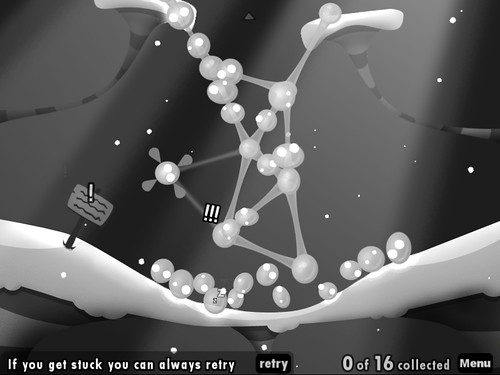
I’m so freaking excited about World of Goo. The preview build 2D Boy sent us – despite being fundamentally a silly building game – left me breathless. It has this sublime, uplifting, wonderful conclusion. And it’s just the first chapter.
The main reason it excites me is something you’d never guess from Tower of Goo, its experimental predecessor. It’s the levels – each is a unique idea, a unique place, and a unique mechanic. In the one pictured above, you’re building downwards to reach albino goos in a dark cave, to wake them from their eternal sleep and bring them to safety.
The last games to do levels so well were Darwinia and Psychonauts – which I guess doesn’t put Goo in best-selling company. But the fact that it’s coming to Wii ought to help with that. And you. You ought to help with that.
Basically, in my preview, I ask you to buy it. You’re not really supposed to do that in previews. There’s no demo yet, and as I say Tower of Goo really suggests nothing of its genius. But if you do pre-order, you get the same first chapter I played right now – plus a, er, ‘Profanity Pack’. That’s it, that’s all I got. It’s beautiful, and fun, and it’s going to be one of the highlights of this year.
I probably shouldn’t go into marketing.
Update: Comments disabled for a bit, due to a weird spate of inept spammers who don’t even link or mention the site they’re spamming for.
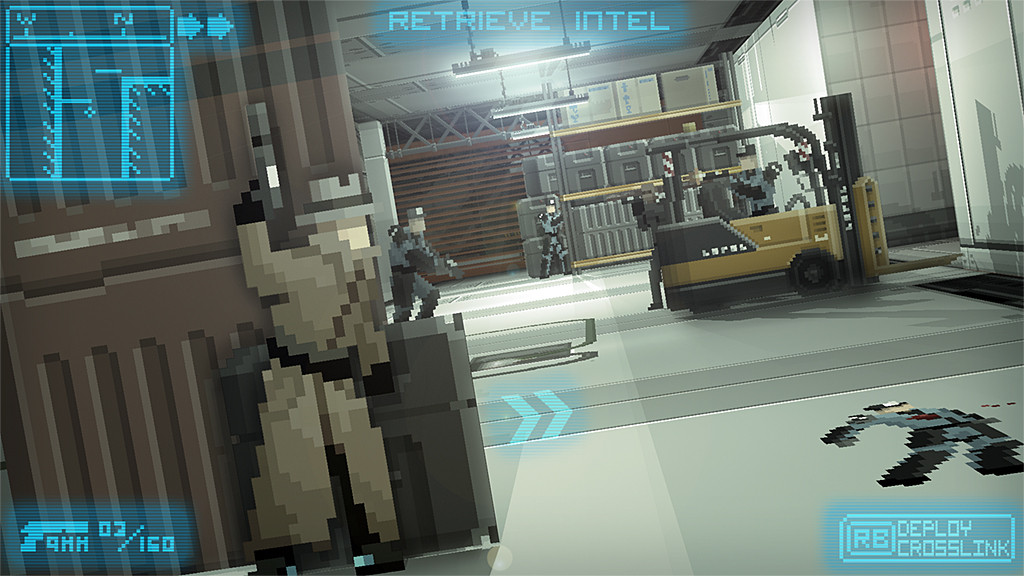
PRESS RELEASE
UNITED KINGDOM – April 1, 2012 – Intense creative re-focussing has led Gunpoint to be re-invented as a 3rd person cover shooter.
“We’re going to make a lot more money this way”, says morally bankrupt CEO.
(This was an April Fools)
Powered Down For Redesign
Because testing this stuff offline is an enormous hassle, and WordPress has masses of functions that are only valid when used in this: the main index file; James will be down, malfunctioning, hideous or utterly screwed up for many many hours tonight. If it’s not fixed by the time I get bored of fixing it, I’ll revert to this design and give up. Either way, it’ll be a working website again on Sunday.
Posts About Games Writing Suck So I’m Writing A Post About Posts About Games Writing
I’m not partaking of the upsurge of inter-linked So You Want To Be A Games Journalist pieces that the awfulness of this one has caused, I guess because I see its two main offputting features as its self-indulgent subject matter and mind-boggling length. I haven’t read it, will never read it, but in attempting to find the URL for that link I caught myself ingesting a few sentences, and the gag-impulse to vomit a correction or mockery was violent. Despite over-writing pathologically myself, my favourite internet acronym – one I think is an enormously powerful positive force towards better writing – is tl;dr. If I ever feel in a position to lecture you on how to be more like me, please ignore me. And if I feel an article you weren’t going to read anyway demands a parody that is almost as long and requires you to read the tedious original to appreciate, restrain me. But if it occurs to me that a particularly catchy Jeffrey Lewis song is appropriate, please accept it into your hard drive.
The appropriate response to something foul is not to ingest it. If you already have, it is more polite to regurgitate privately, into a bucket.
Postcards From Point Lookout
I’ve been playing the inbred-hick themed Fallout 3 downloadable expansion. It’s the only one of them I’ve liked so far, but I haven’t tried Mothership Zeta yet – and it looks awful pretty.
Full set is here, full set as fullscreenable slideshow is here.
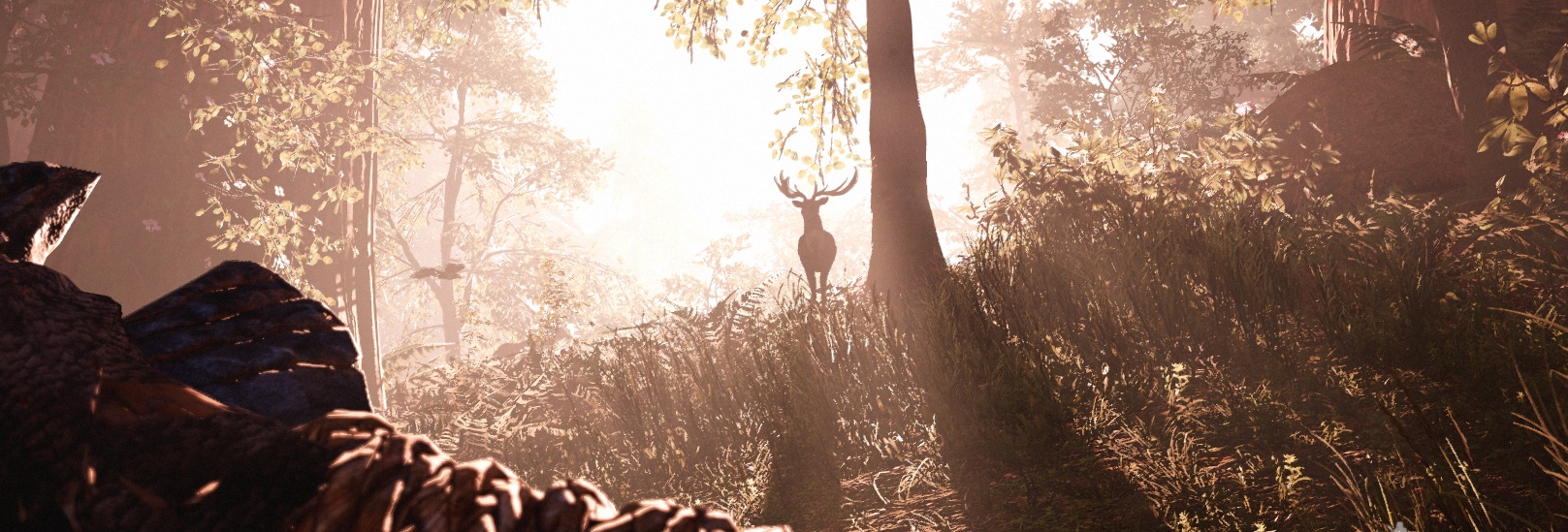
Postcards From Far Cry Primal
I was not at all ready for how gorgeous Far Cry Primal is. I walk around it in a daze, gawping at god rays and moon beams and frantically switching weapons and HUD elements* to get them out of the way long enough to take a screenshot. Even twenty hours in it’s still staggering me on a regular basis. Here are some of my favourites so far.
* This was often made easier by a Cheat Engine script Duncan Harris made for it. If you know what that is or are prepared to Google, you can grab his script here. Continued
Postcards From A Weekend Of Premeditated Murder
A slightly tense week inspired me to go back to Hitman: Blood Money last weekend. It is cathartic.
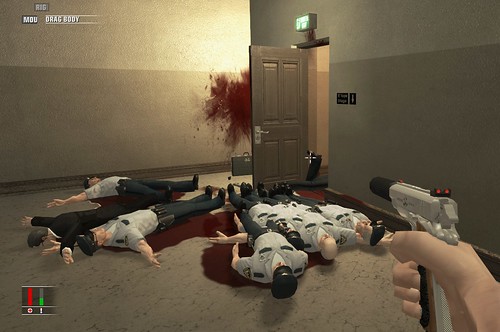 Well, yes, now it’s obvious where the killer was standing.
Well, yes, now it’s obvious where the killer was standing.
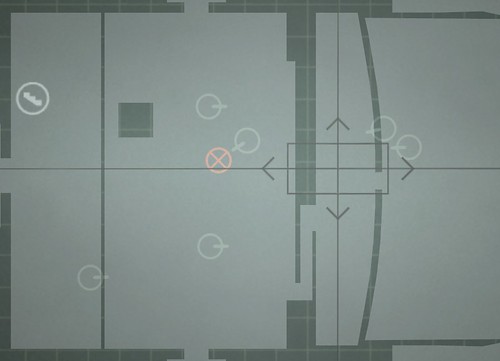 This is the climax of a spectacularly machiavellian plot to replace an actor’s prop pistol with a real one to trick him into performing your hit for you at the crescendo of a wartime opera.
This is the climax of a spectacularly machiavellian plot to replace an actor’s prop pistol with a real one to trick him into performing your hit for you at the crescendo of a wartime opera.
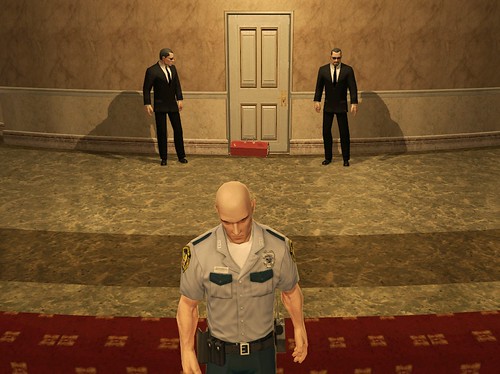 I’ll save you the trouble – yes, there’s a bomb in that.
I’ll save you the trouble – yes, there’s a bomb in that.
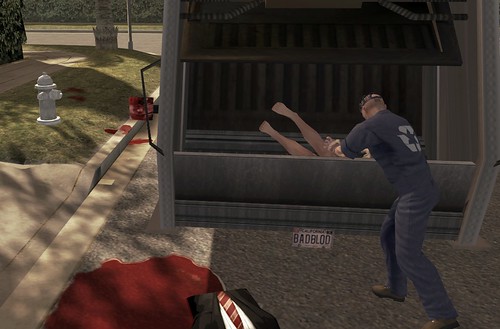 I don’t know why, but as I trash-compacted this sanitation worker, it really bothered me that I was depriving society of the valuable service he provides.
I don’t know why, but as I trash-compacted this sanitation worker, it really bothered me that I was depriving society of the valuable service he provides.
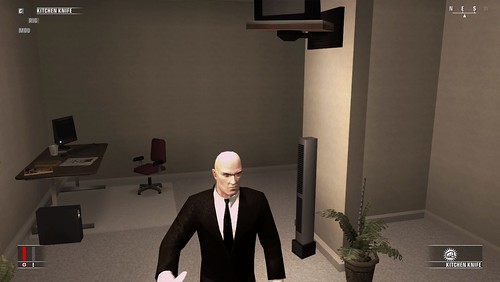 If you’re in witness protection, don’t let them put you in a house with a wall like this.
If you’re in witness protection, don’t let them put you in a house with a wall like this.
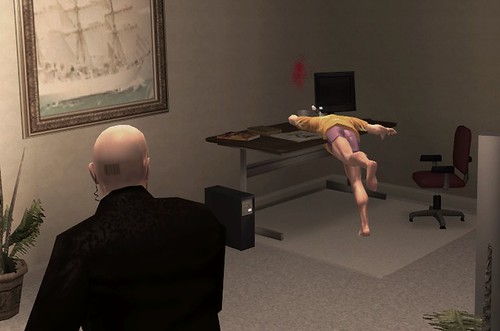 In case someone hides there and throws a kitchen knife into your head like this.
In case someone hides there and throws a kitchen knife into your head like this.
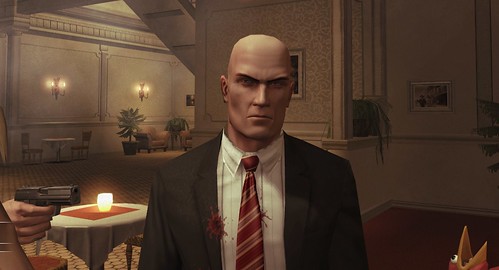 In retrospect, yes, it was always going to be difficult to get away with killing that bird in front of this cop.
In retrospect, yes, it was always going to be difficult to get away with killing that bird in front of this cop.
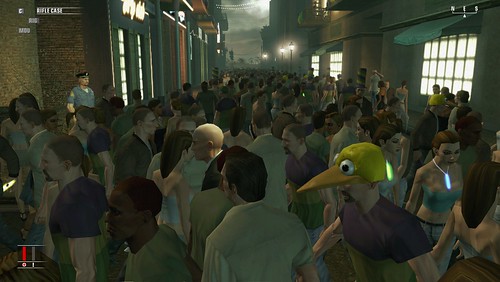 I still don’t know how they did this goddamn crowd scene. How- polygons- what?
I still don’t know how they did this goddamn crowd scene. How- polygons- what?
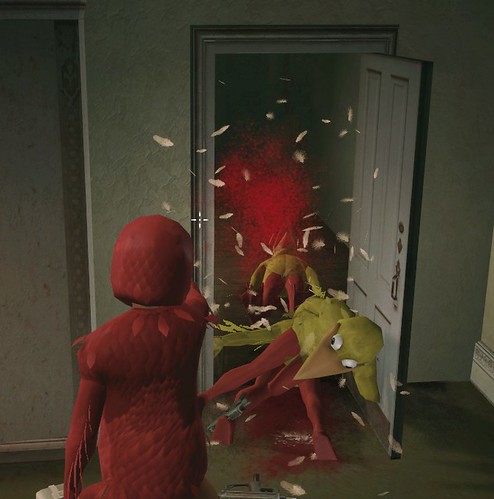 This is as tragicomic as it is hilarisad.
This is as tragicomic as it is hilarisad.
 I am especially unclear on where I keep my pistols in this outfit.
I am especially unclear on where I keep my pistols in this outfit.
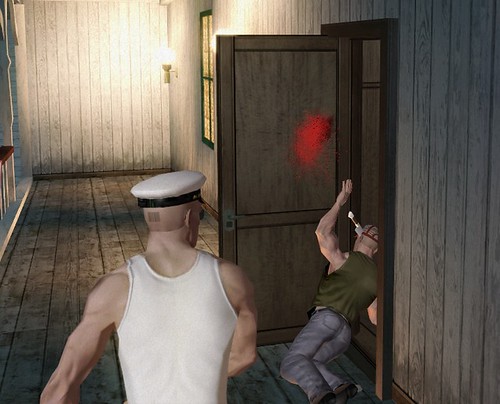 Yes, I have done this more than once.
Yes, I have done this more than once.
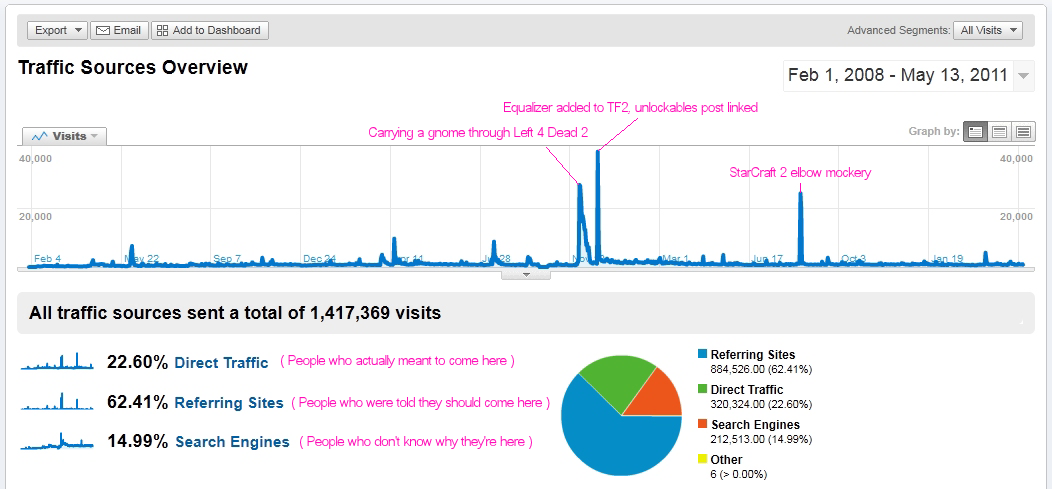
Post 500
Quickly, drink this. I just found a retroactive excuse for tonight’s pina coladas: I’ve posted 500 things on this site?
This 500th post calls for MINIMUM CONTENT and MAXIMUM STATS. They start from when the site moved to Pentadact.com in February 2008, and the graph looks a bit like this (click for readable size): Continued
Porn Shoes
What I love about Porn Shoes by The French is that almost nothing happens in it. It’s about a date, but describes only the moment at which the girl arrives. It’s completely unromantic – they’re not entirely into each other, and the guy’s feelings are neither idealised nor entirely boorish. It’s about small, normal emotions instead of soul-consuming love or crushing loss. The lyrics are plain, so it poeticises the affair solely with music, letting the electric blips and synth ebb suggest the mood and significance.
Like Kylie wore on TV
They kept her feeling sexy
They were what she always wanted
But he thought they looked like porn shoes
Like the porn stars wear in porn films
“I tried to place as many brand names in there as possible,” Hayman notes, “in the hope that it might get me advertising work.”
Podcast Tips: Nick Frost On WTF
Sometimes I’ll recommend you a particularly great episode of a podcast I listen to. Feel free to recommend your own in the comments! I probably don’t have to tell you that Serial is great.
Co-star of Spaced and Shaun of the Dead talks to Marc Maron about what he was doing before all of that, the nature of which you would probably never guess. On the party where he first met Simon Pegg:
“I was nervous to meet him. He was this stand-up comedian, and I was the funniest waiter at Chiquitos. We circled each other all night, until finally we were outside on a roof together, and we just did impressions at each other, for hours. It was like the duelling banjos.”
Edit: as with any interview podcast, skip the intro until you hear the guest. It’s like 14 fucking minutes here.
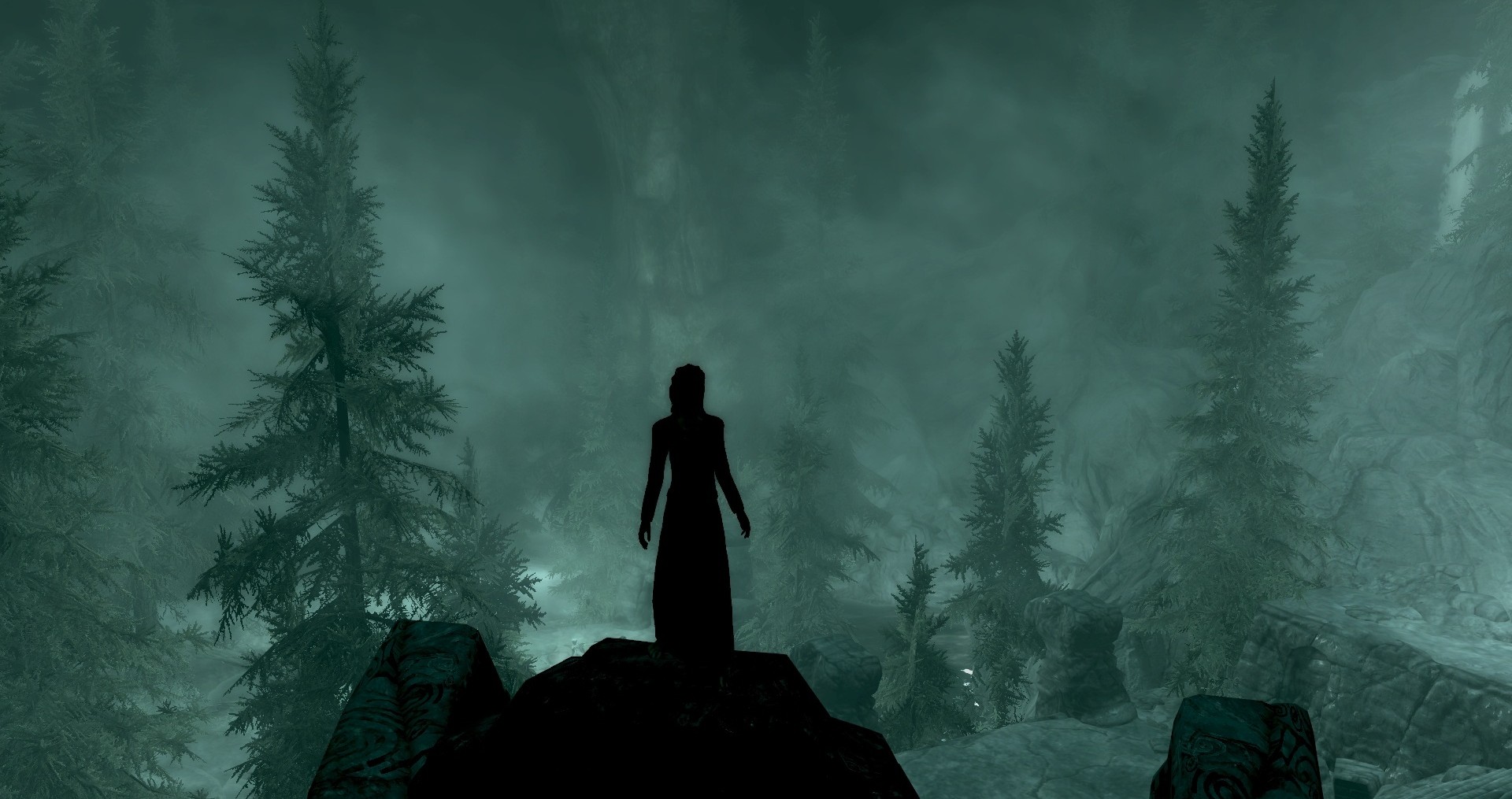
Playing Skyrim With Nothing But Illusion
“In Skyrim, a mage is an unstoppable storm of destruction. In real life, a mage is just an illusionist: they can’t do much except trick you. If one of them turned out to be the world’s only hope of salvation, hijinks and sudden death would inevitably ensue. Since these are my two favourite things, I’ve decided to try playing this way.”
My diary of an illusionist in Skyrim is now all online. Start from the first entry, or if you’re up to date, here’s the final one.
Hope you enjoy/enjoyed it. It totally reinvented the game for me, made the world feel dangerous in a way it hadn’t since I first started. And something about having no weapons or armour makes the experience more convincing – I found myself appreciating the scenery more, being happy to trudge through the sparkling snow on a sunny day.
It makes me really want a Skyrim Survival Mode. One where you remain realistically vulnerable at all times, and leaving a town is heart-thumpingly tense. You’d need to eat before you could sleep, and sleep once a day to stay sharp. The only impetus to risk the wilderness would be to hunt animals, gather ingredients, or hope to find something valuable enough to sell for food before you find something too fast to run from.
Playing Risk Of Rain: The Engineer And The Shitty Lantern
Here’s what Risk of Rain is like. It’s a randomised shooter thingy, and here I’m playing as one of the classes you unlock later on, the Engineer. More thoughts on why it’s good.
Playing Assassin’s Creed 4: You Can’t Sword Fire, Man
I’m thinking about posting these Let’s Play style videos as shorter, individual highlights rather than recording every moment and putting it all up in long sequential chunks. Well, shorter than 50 minutes. That felt like overkill, and it also meant I felt weirdly guilty if I wanted to do something that’s boring to watch.
